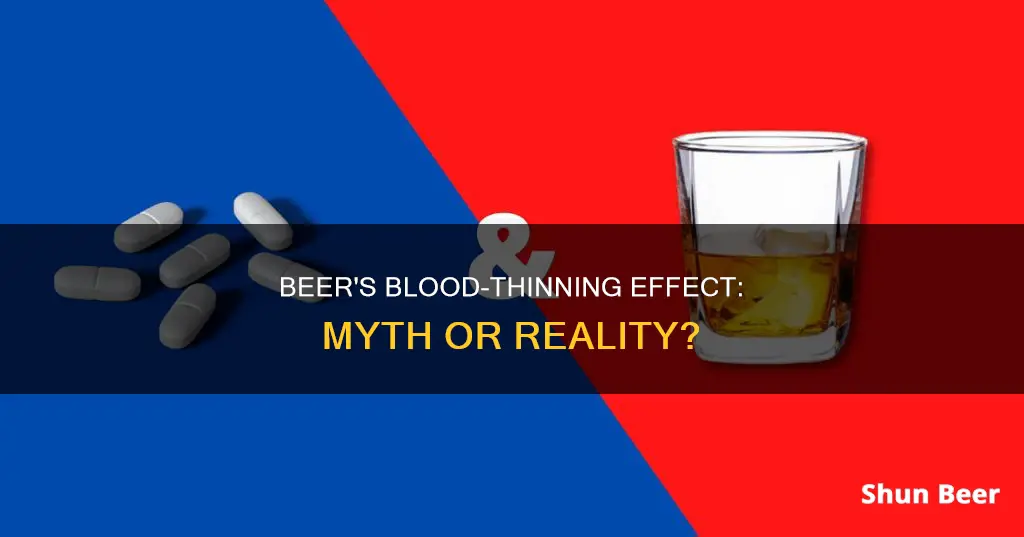
Drinking alcohol can be a sensitive topic for patients and doctors. Alcohol, in low to moderate amounts, thins the blood, potentially reducing the risk of clots. However, moderation is critical, and doctors do not recommend drinking alcohol to prevent deep vein thrombosis (DVT). Blood thinners are drugs that prevent blood clots from forming, and alcohol can affect how they work in the body. So, does beer work as a blood thinner?
| Characteristics | Values |
|---|---|
| Alcohol as a blood thinner | Alcohol, in low to moderate amounts, thins the blood. |
| Beer as a blood thinner | Beer may have similar blood-thinning effects to alcohol. |
| Risks | Excessive alcohol consumption can increase the risk of bleeding, especially when combined with blood thinners. |
| Recommendations | It is generally recommended to consult a doctor or pharmacist before consuming alcohol with blood thinners. Moderate alcohol consumption is usually considered safe while taking most blood thinners. |
What You'll Learn

Alcohol and blood thinner side effects
Mixing alcohol with blood thinners can have several side effects and health risks. Alcohol can affect how well your blood clots, and it can also limit your liver's ability to metabolize compounds and your kidneys' ability to excrete toxins or drugs. This can lead to an increased risk of severe bleeding during an accident or injury.
Alcohol's Effect on Blood Clotting
Alcohol affects how thin your blood is. Light to moderate alcohol consumption can thin your blood, while heavy drinking increases the likelihood of blood clots forming. This can be dangerous for people taking blood thinners, as these medications also slow down the blood clotting process. Mixing alcohol and blood thinners can cause the blood to become too thin, leading to a high risk of bleeding from minor injuries. It could also reverse the effects of blood thinners, increasing the risk of heart attacks or strokes.
Alcohol's Interaction with Medications
Alcohol can alter how active blood-thinning medications are, affecting the delicate balance that doctors aim to achieve. It can also increase the time it takes for someone to stop bleeding, similar to the effect of blood thinners. Additionally, alcohol can affect how long it takes for your body to process these medications, causing them to stay active for longer and have a greater effect.
Risks and Recommendations
The combination of alcohol and blood thinners can lead to either bleeding or clot-related problems. It is important to note that people with liver problems may need to be more cautious when consuming alcohol while on blood thinners. Even if you have a normally functioning liver and kidneys, alcohol can still impact their ability to process other compounds and medications.
Doctors generally advise people taking blood thinners to moderate their alcohol intake. It is recommended to limit alcohol intake to a maximum of two drinks per day for men and one drink per day for women. However, some individuals should completely avoid alcohol while on blood thinners, including those under the legal drinking age, recovering from alcohol use disorder, or unable to control their drinking.
Beer Slug Traps: Do They Work?
You may want to see also

Alcohol and blood thinner interactions
Effects of Alcohol on Blood Clotting
Light to moderate alcohol consumption can have a blood-thinning effect, making the blood less viscous and reducing the likelihood of blood clots. However, heavy alcohol consumption can have the opposite effect, increasing the risk of blood clot formation. Therefore, using alcohol specifically to thin the blood or improve heart health is not recommended.
Blood Thinner Medications
Blood thinners are medications that slow down the body's ability to coagulate blood, preventing or reducing the formation of blood clots. There are two main types of blood thinners:
- Anticoagulants: These drugs, such as warfarin (Coumadin), prevent the blood from clotting.
- Antiplatelet drugs: These drugs, such as aspirin, prevent platelets (blood cells) from sticking together and forming clots.
Interaction between Alcohol and Blood Thinners
Mixing alcohol and blood thinners is generally not recommended. Alcohol can alter how thin the blood is and change the activity of the medication. This delicate balance is crucial in the use of blood thinners, and disruptions can lead to either excessive bleeding or an increased risk of dangerous conditions like heart attack or stroke.
Health Risks and Side Effects
The combination of alcohol and blood thinners can increase the risk of severe bleeding during accidents or injuries. It can also affect how long it takes for bleeding to stop. Additionally, alcohol can exacerbate certain side effects of blood thinners, such as dizziness or lightheadedness, especially if the individual has high blood pressure.
Precautions and Recommendations
When taking blood thinners, it is essential to consult with a healthcare professional before consuming alcohol. The specific risks vary for each individual and depend on their medical history, the type of blood thinner, and other factors. In some cases, moderate alcohol consumption may be permissible, while in others, it may be advised to avoid alcohol completely. Those taking warfarin, for example, should avoid heavy drinking, as it can increase the risk of bleeding.
It is crucial to monitor for signs of bleeding, such as easy bruising or prolonged bleeding from cuts, and to seek medical attention if these occur. Additionally, individuals with liver problems may need to be more cautious due to the role of the liver in metabolizing both alcohol and blood thinners.
Beer Foam Stones: Do They Work?
You may want to see also

Alcohol's effect on blood clotting
Alcohol can act as a blood thinner, reducing the blood's natural ability to form clots. This means that drinking alcohol can potentially increase the risk of bleeding, especially when consumed in large quantities. For men, this means more than two drinks a day, and for women, this means more than one drink a day.
Alcohol interferes with the clotting process by reducing the number of platelets in the blood and making the remaining platelets less sticky. Platelets are blood cells that rush to the site of an injury and clump together to form a plug and close the wound.
In people who drink moderately, the effect of alcohol on platelets is short-lived. Moderate drinking is defined as up to one drink per day for women and up to two drinks per day for men. However, in people who drink heavily, there can be a rebound effect, where the risk of bleeding increases even after they have stopped drinking.
While alcohol can have a blood-thinning effect, the risks associated with drinking alcohol outweigh any potential health benefits. Alcohol use, especially in excess, can pose several health risks, including an increased risk of injuries, sexually transmitted diseases, cancer, birth defects, miscarriage, and alcohol dependence.
Additionally, drinking alcohol while taking prescription blood thinners can be dangerous. Both alcohol and blood thinners thin the blood, so taking them together could compound the anticoagulant effect and further increase the risk of bleeding. Alcohol can also slow down the rate at which the body breaks down and removes the blood-thinning drug, leading to a dangerous buildup in the body.
Therefore, it is essential to speak with a healthcare provider before consuming alcohol while taking blood thinners. While occasional, moderate alcohol consumption is generally considered safe for most people on blood thinners, it is not recommended for those with liver problems or a history of alcohol misuse.
Beer Traps: Effective Snail Control or Urban Myth?
You may want to see also

Safe alcohol consumption on blood thinners
Blood thinners are drugs that prevent blood clots from forming. Doctors may advise people taking these medications to moderate their alcohol intake. Alcohol can also affect how long it takes for someone to stop bleeding, similar to blood thinners. Combining alcohol with blood thinners can result in side effects. Therefore, it is important to consult a doctor or pharmacist before drinking alcohol while taking blood thinners.
Factors affecting alcohol consumption while taking blood thinners
There are several factors that determine how dangerous alcohol consumption is while taking blood thinners. These factors include the type of blood thinner, the individual's medical situation, and their overall health. It is important to confirm with a healthcare professional whether it is safe to consume alcohol while taking blood thinners.
Recommendations for alcohol consumption with blood thinners
Moderate alcohol consumption is generally considered safe while taking most blood thinners. For healthy adults, doctors recommend limiting alcohol intake to a maximum of two drinks per day for males and one drink per day for females. However, people taking specific blood thinners, such as warfarin or Aggrenox, should limit their alcohol intake as heavy drinking can increase the risk of bleeding.
Signs to call a doctor
It is important to monitor for signs of bleeding, such as easy bruising or bleeding from cuts that take longer than usual to stop. If there is a large amount of visible blood loss due to an injury, it is crucial to seek immediate emergency medical care. Internal bleeding, although rare, can also occur and should be examined by a healthcare professional, especially if there is a head injury. Common symptoms of internal bleeding include an altered mental state and severely low blood pressure.
Alcohol consumption and cardiovascular health
Moderate alcohol consumption has been associated with a reduced risk of cardiovascular and stroke deaths, as well as decreased rates of coronary artery disease and non-fatal strokes. However, there are still risks associated with any amount of alcohol consumption. Alcohol can affect the liver's ability to metabolize compounds and the kidneys' ability to excrete toxins or drugs, which can lead to excessive anticoagulation.
Resources for reducing alcohol intake
For individuals struggling with alcohol use disorder or those vulnerable to alcohol misuse, there are resources and tools available to help reduce alcohol intake. The National Institute on Alcohol Abuse and Alcoholism (NIAAA) is a comprehensive resource that provides information and support for individuals looking to reduce their alcohol consumption.
Do Sulfite Wands Really Work for Beer?
You may want to see also

Blood thinner alternatives to alcohol
Beer is not the only substance that can thin the blood. Blood thinners, also known as anticoagulants, are medications that prevent blood clots from forming. Doctors prescribe two types of blood thinners: anticoagulants and antiplatelet drugs. Here are some alternatives to alcohol that can act as blood thinners:
- Aspirin: Aspirin is an antiplatelet drug that prevents platelets, a type of blood cell, from sticking together and forming clots. However, it is important to note that combining aspirin with alcohol can increase the risk of stomach bleeding.
- Aggrenox: Aggrenox is a combination of acetylsalicylic acid and dipyridamole. While it can help prevent blood clots, heavy drinking while taking this medication is not advised due to the increased risk of stomach bleeding.
- Low Molecular Weight Heparins: This type of blood thinner helps prevent blood clots but may require monitoring and dose adjustment if combined with alcohol.
- Direct Thrombin Inhibitors: This newer class of blood thinners includes medications such as dabigatran (Pradaxa). They offer benefits over older blood thinners but should still be used cautiously with alcohol to lower the risk of serious bleeding.
- Factor Xa Inhibitors: This group includes medications like apixaban (Eliquis), edoxaban (Savaysa), and rivaroxaban (Xarelto). Their mechanism of action is not affected by moderate alcohol consumption, but excessive drinking may increase bleeding risk.
It is important to remember that even if you are taking these blood thinner alternatives, you should always consult your doctor or pharmacist before consuming alcohol. They can advise you on the potential risks and interactions based on your individual health status and the specific medication you are taking.
How Well Do Beer Thermoses Work?
You may want to see also
Frequently asked questions
It depends on several factors, including the type of blood thinner and your overall health. Generally, moderate alcohol consumption is considered safe, but always consult a healthcare professional first.
Experts believe moderate drinking may offer health benefits, but opinions vary. While some studies suggest a reduced risk of cardiovascular and stroke deaths, there are risks associated with any alcohol consumption.
Yes, alcohol can increase your risk of bleeding, especially when combined with blood thinners. It can also affect how your body metabolises and breaks down medications, potentially leading to harmful effects.
Traumatic injuries are a common cause of bleeding. Seek immediate medical attention for large amounts of visible blood loss. Internal bleeding may be harder to identify but can be life-threatening, especially if it affects the head.
Alcohol itself is a blood thinner, so any type of alcoholic drink, including beer, wine, or liquor, can have similar effects when combined with blood-thinning medications. Always exercise caution and moderation, and consult your doctor for personalised advice.







